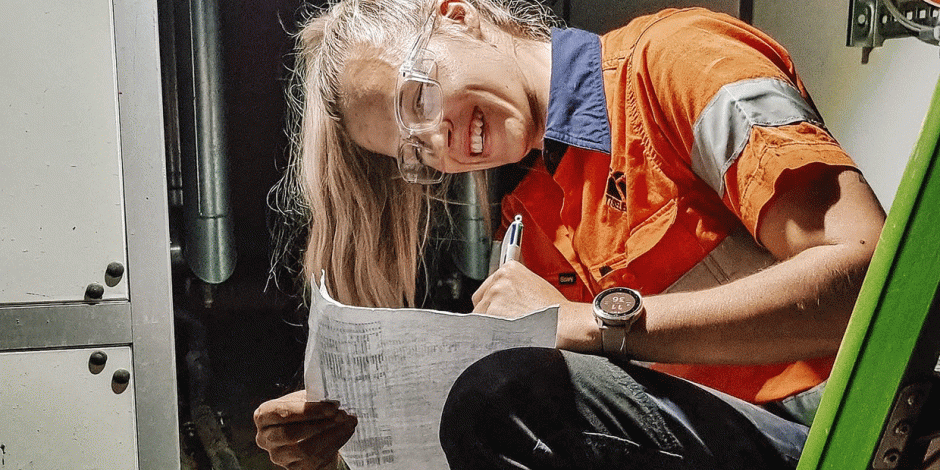Starten Sie den Audio-Text
Mit dem Audio-Player können Sie sich den Text anhören. Darunter finden Sie das Transkript.
Sion: Have you ever hired a female electrician? If you answered “no”, that might be because there are comparatively more male electricians. The percentage of female electricians hover between sth. and sth.zwischen etw. und etw. schwankenhovers between one and four per cent in many developed countries. Business Spotlight catch up with sb.hier: mit jmdm. sprechencaught up with Tamarah Vos, a young female electrician based in Brisbane, Australia. In Australia, just four per cent of electricians are female. Firstly, we asked Tamarah to explain how she began her career in the tradeBeruf, Handwerktrade.
Tamarah: My dad was actually an electrician, so I was be exposed to sth.etw. ausgesetzt sein; hier: mit etw. konfrontiert seinexposed to work on the weekends with him and what the trade life could look like. So, it was really the only trade I wanted to get into because I really loved the technical side of being an electrician, when it comes to maths and all of the different parts to it. So, yeah, my dad was my biggest influence into getting into the trade. And, also, I was not that good at studying, so getting my hands on the tools and being in an active environmentUmfeldenvironment was really important, too. I did not go to university. I actually drop out of schooldie Schule abbrechendropped out of high school at year 11 and entered my trade four days after I finished up at school and then have been working full time ever since.
Sion: We asked Tamarah about the realities of working in such a male-dominated sector.
Tamarah: I was very fortunate that my team was very accepting. However, I still felt different, as I was the only female, and I did not come across sb.jmdm. (zufällig) begegnencome across any other females for probably the first six years of my trade career. But there was always just that funny look, that weird (ifml.)seltsamweird interaction at first when they started seeing you. But it was just building trust and respect within the industry to show that you actually can do the job, and then everyone kind of started treating me the same, which was good.
Sion: OK, now decide whether the following statements based on these first two interview extracts are true or false.
1. Tamarah’s experience working with her father as an electrician dissuade sb. from doing sth.jmdm. ausreden, etw. zu tundissuaded her from entering the profession.
➤ This statement is false. Tamarah was “exposed to work on the weekends” with her father, who worked as an electrician. She enjoyed the work so much that she decided to pursue sth.etw. nachgehen; hier: ergreifenpursue the trade herself. The verb “dissuade” somebody is the opposite of “persuade” somebody. It means to “put somebody off” or “discourage somebody from doing something”.
2. Tamarah likes the physical and practical nature of working as an electrician.
➤ This statement is true. She talks about “getting her hands on the tools” and being in an “active environment”. She refers to these aspects as being “really important”.
3. Tamarah felt she had to prove her skills to her male colleagues.
➤ This statement is true. Tamarah said it was about showing that she could do the job. This allowed her to build trust and respect, and everyone then started treating her the same as they treated her male colleagues.
Sion: Now, let’s continue with another two extracts from our interview with Tamarah. She emphasized the importance of trades being spoken about more positively in schools.
Tamarah: I think it really starts in the schools. It’s schools get sb. on boardjmdn. mit ins Boot holengetting on board and showing people that apprenticeshipLehre, Berufsausbildungapprenticeships and trade is actually a really good career path(way)berufliche Laufbahncareer path for you, not one because you can’t go to university. Choosing a trade can, you know, really set sb. up for sth.hier: jmdn. auf etw. vorbereitenset you up for life, and I think that schools really need to start showing that at the early ages and giving people the opportunity to understand the trade rather than just saying, “Well, if you don’t go to university, I guess you have to do sth.hier: etw. ausübendo a trade.” So I think that it definitely starts there. And then also getting tradesman/-womanHandwerker(in)tradeswomen out into the public and into those schools to show the younger females that there is [non-standard] people out there doing it so they actually have something to look up to, to get a better understanding of what it could be like to be a tradeswoman. I think it really starts there.
Sion: There are several advantages to working in a trade that you might not have initially considered.
Tamarah: Having my trade as an electrician means that I have so many opportunities for different career pathways. I’m not be stuck to sth. (non-stand.)hier: auf etw. festgelegt seinstuck to one thing. I can go into industrialhier: Industrieindustrial. I can stay in domestichier: Privathaushaltedomestic. I can get into something like project management. And I could also still go back and study if I would like to. And it also gives me a really great opportunity to travel internationally and use my trade wherever I want. And it has given me the confidence to be able to do things on my own home. So, you know, I can help out friends with electrical work or I can renovate my own house. And it’s giving me the confidence to pick up tools and give sth. a goetw. versuchengive things a go, which I don’t think that you would necessarily get if you were in a traditional office job.
Sion: OK, now decide whether the following statements based on these final interview extracts are true or false.
1. Tamarah doesn’t like the idea of presenting trades as a backup option.
➤ This statement is true. She talks about trades offering a good career path, not just one that you can do if you don’t go to university. A “backup” option is an alternative choice if your first choice is not available to you.
2. Tamarah thinks tradeswomen could be great role models for young females.
➤ This statement is true. She talks about giving young females someone to “look up to” in the industry.
3. The limited career prospectAussichtprospects are one downsideNachteildownside of the job.
➤ This statement is false. “Career prospects” are opportunities related to professional growth.
4. When work needs to be done on her own home, Tamarah can rely on sth.sich auf etw. verlassenrely on her network of friends in other trades to help out.
➤ This statement is false. Tamarah talks about feeling more confident to renovate her own home herself.
5. Tamarah thinks a traditional office job would have made her more be reluctant to do sth.etw. (nur) widerwillig tunreluctant to pick up tools herself.
➤ This statement is true. She doesn’t think she would have had the confidence to pick up tools and do renovation work if she had a traditional office job.
Sion: Did you get those right? If so, great! If not, listen to the interview once more and try the exercises again.
Neugierig auf mehr?
Dann nutzen Sie die Möglichkeit und stellen Sie sich Ihr optimales Abo ganz nach Ihren Wünschen zusammen.



